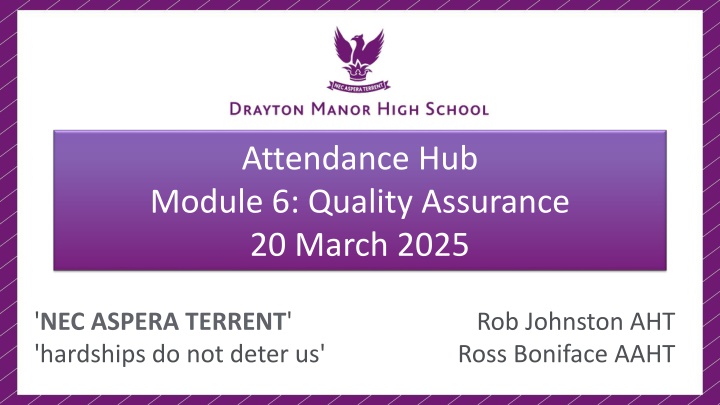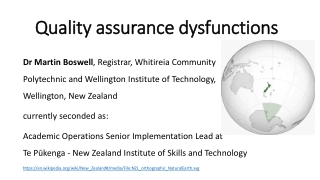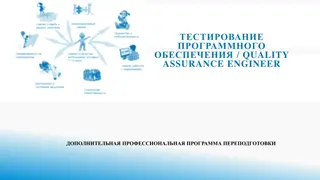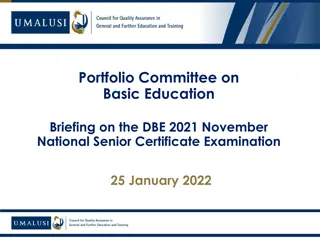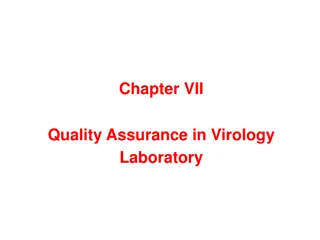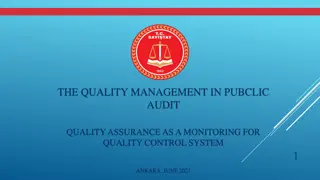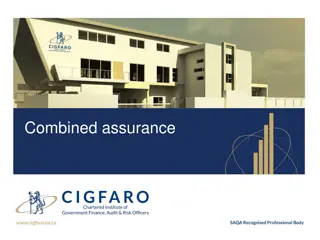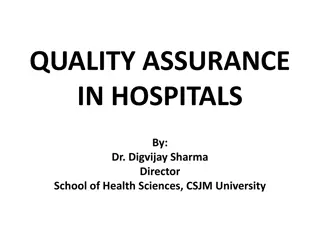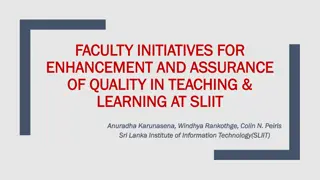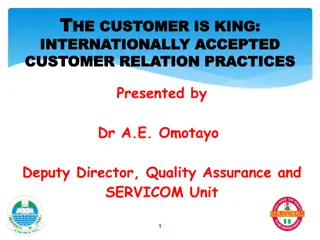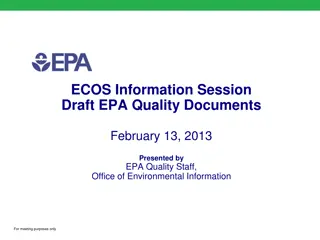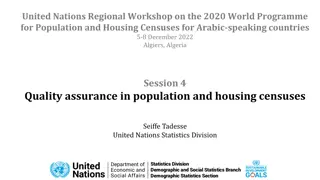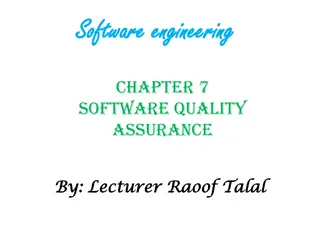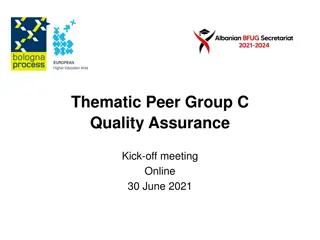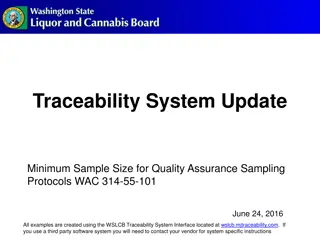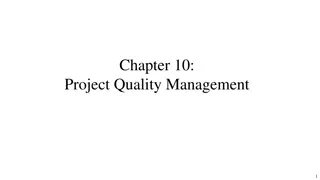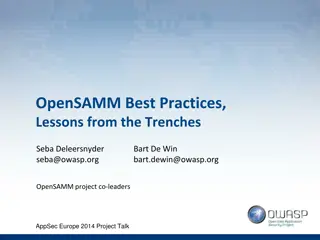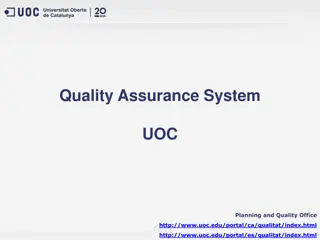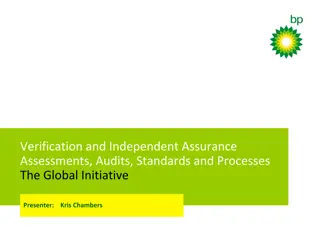Quality Assurance Protocols and Best Practices
Detailing systematic quality assurance protocols and best practices for attendance systems and procedures, including training, feedback, and modeling for improvement. Explore key areas to quality assure and why it matters in maintaining attendance integrity and excellence.
Download Presentation

Please find below an Image/Link to download the presentation.
The content on the website is provided AS IS for your information and personal use only. It may not be sold, licensed, or shared on other websites without obtaining consent from the author.If you encounter any issues during the download, it is possible that the publisher has removed the file from their server.
You are allowed to download the files provided on this website for personal or commercial use, subject to the condition that they are used lawfully. All files are the property of their respective owners.
The content on the website is provided AS IS for your information and personal use only. It may not be sold, licensed, or shared on other websites without obtaining consent from the author.
E N D
Presentation Transcript
Attendance Hub Module 6: Quality Assurance 20 March 2025 'NEC ASPERA TERRENT' 'hardships do not deter us' Rob Johnston AHT Ross Boniface AAHT
Housekeeping and Expectations Expectations for hub partner schools and lead school The sessions will be recorded and available after the session Questions posted into the chat. There will be a chance to answer at pause points attendancehub@draytonmanorhighschool.co.uk Resources page: https://www.draytonmanorhighschool.co.uk/school- resources.php
Objectives 1. To detail systematic quality assurance protocols that have worked in our context 2. To provide an opportunity for you to consider your own protocols
Pause Point 1 "Sharpening the right tools for the right job" 1. 2. 3. 4. What should we QA in relation to attendance systems and procedures? What might we look for? What is the role of modelling best practice? How should feedback be delivered, especially considering some staff may be non- teaching? What is the role of the calendar? How might data inform/support your QA? How might you use your stakeholders? 5. 6. 7.
What should we Quality Assure and Why? What? 1. Why? The work of key staff in your team e.g. Attendance Officer what are their key duties each day? Are they completed effectively? Contacting home e.g Absence calls/texts timing, script usage/tone Coding are the right codes being input for the right reasons and at the right time (10.30am?)? Threshold system implementation - letters/pastoral meetings/attendance contracts/fines/EWO involvement Outcome = Attendance figure Integrity and excellence Identifying areas of strength to celebrate Identifying growth areas before they become concern areas Culture of improvement 2. 3. 4.
Making it Work (The QA Cycle) Train and model best practice Feedback be brave in your conversations Quality Assure implementation
Training and Modelling Best Practice 1. Job descriptions and descriptions of role and responsibility at every level 2. Checklists and guides 3. Scripts for parent interactions (phone conversations and meetings) 4. Modelling these and supporting colleagues during implementation 5. Support following feedback (deliberate practice) 6. Line Management support weekly focus for Pastoral Leaders
How do we Quality Assure our systems? "Clarity and Certainty"
Getting Viewpoints and Input Regular student panels and hotspot mapping (where do students feel unsafe) o Impact: Early identification of barriers to school attendance and pre-emptive actions Regular Student Council and Student Voice o Impact: Early identification of trends/Social Media influence/Local context/issues that can influence attendance Regular Staff Panels o Impact: Provide useful data/information about implementation of staff led initiatives/on the ground information about student cohorts Safeguarding and Attendance External Audits
Feedback Conversations 1. We have integrity and are aiming for excellence 2. We aim to ensure staff have clarity of what is expected, provide training on best practice and are consistent in our QA methods and approach 3. This provides us with the basis to intervene early and have honest feedback conversations that support improvements
Feedback Conversations Honest feedback conversations 1. Identify the exact problem/s at a granular level and its impact (clarity) 2. Check the problem is persistent/not a one off (certainty) 3. Agree time and place to meet in advance in person explaining that the topic of the conversation to be had 4. Script the feedback conversation Detail of the concern Detail how the problem has impacted the school/individuals Detail of why it is important the problem is resolved Detail of possible solutions but script for them to provide input on the next steps required to resolve 5. Agree what and when action will be taken as well as any training that is required 6. Agree follow up QA and meeting/s to check on progress 7. Follow up in writing Question: Despite support and training, what should happen if the desired result isn't achieved and the issue persists?
'Break Out' Rooms Questions to focus the conversation 1. Is everyone clear about their role and how to do it well? 2. How do you QA this currently, what do you not? 3. How systematic is your protocol? Does everyone know what, who and when processes occur? 4. What role have your team had in developing the QA processes? Should they be involved? 5. What action do you take when concerns/problems arise? 6. What processes do you have to identify and intervene early?
WHY WE FOCUS ON TRANSITION? We start to build a relationship with each family before they arrive, and they start to build a relationship with us Collection of data, trends and experiences of students and their families Plan the use of school resources to meet the needs of our incoming cohort Continue to build momentum throughout the year Attendance Toolkit Drayton Manor High School case study on transition P.13 13
TIMELINE Meetings Visits Early Offer Induction meeting Medical SEND Safeguarding Pastoral LA EWO Primary Schools Parents and students Passport Summer School SEN workshops Parent Events Induction Day Keeping Momentum In School Foci Primary schools Parent Events Student experience Return to school meetings Challenge 96 Assembly and Tutor Programme 14
TRANSITION TASKS September Actions Day 1 absence calls Extra-curricular sign up and advertisement to parents Explicit target setting challenge 96 Baseline testing and screening Tutor attendance calls Return to school meetings Data Events Key Professionals Head of Year Tutor team Year group link SLT Transition Coordinator Student Transition Team DSL SENDco Graduate Inclusion Support Assistants Admission officer LA EWO/ data team Primary staff Early Transfer File (ETF) local authority data Attendance & punctuality Percentage Local authority EWO handover Academic progress Pastoral information (friendships, hobbies) Safeguarding Vulnerability Index (VI) Beyond the School Gates report Medical and Welfare Special Educational Needs (SEND) English as an Additional Language Parent engagement with primary school Parent engagement with transition process Mobility previous primary schools Induction paperwork included within the Information Handbook Pupil Passport Summer School feedback All data combined into the super spreadsheet NEETs Extra-curricular interests Curriculum audits Pre-September Open Evening Parent Open Morning Transition team primary welcome events Primary visits for every feeder school Audience for drama/musical rehearsal Subject HOD primary curriculum visits Passport launch Primary liaison meetings Year 6 teacher DSL safeguarding and welfare SEND and EAL lead 1:1 Induction meetings with all parents and students Year 6 Induction Day SEN workshop days July Parent Welcome Evening Summer School Pre-start visit: collect timetable & meet tutor Post first day Daily debrief (1st week) SLT & Year Team After-school troubleshooting Parent clinics Parent success evening in first two weeks Year 7 music concert in first term PTA invite/ second hand uniform sell Parent curriculum evenings SEN/Parent Coffee Mornings In year admissions Pupil information form Contact previous schools Admission pre-meeting Baseline testing and screening Post testing meeting Head Teacher meeting Assigned buddy Keeping Momentum Assess, Plan, Do, Review Leadership professional curiosity of the trends of the year Uncovering what the data tells you Developing the culture of the year group Extracurricular sign up Early parent meetings and attendance contracting Staying connected with primaries Strategic Discussion Points How do we assess the needs of the cohort? How do we plan effectively for the incoming cohort and adapt the curriculum where required? What resources do we have available to use? How do we build and establish relationships with schools, students and families? How do we know our transition offer is fit for purpose?
